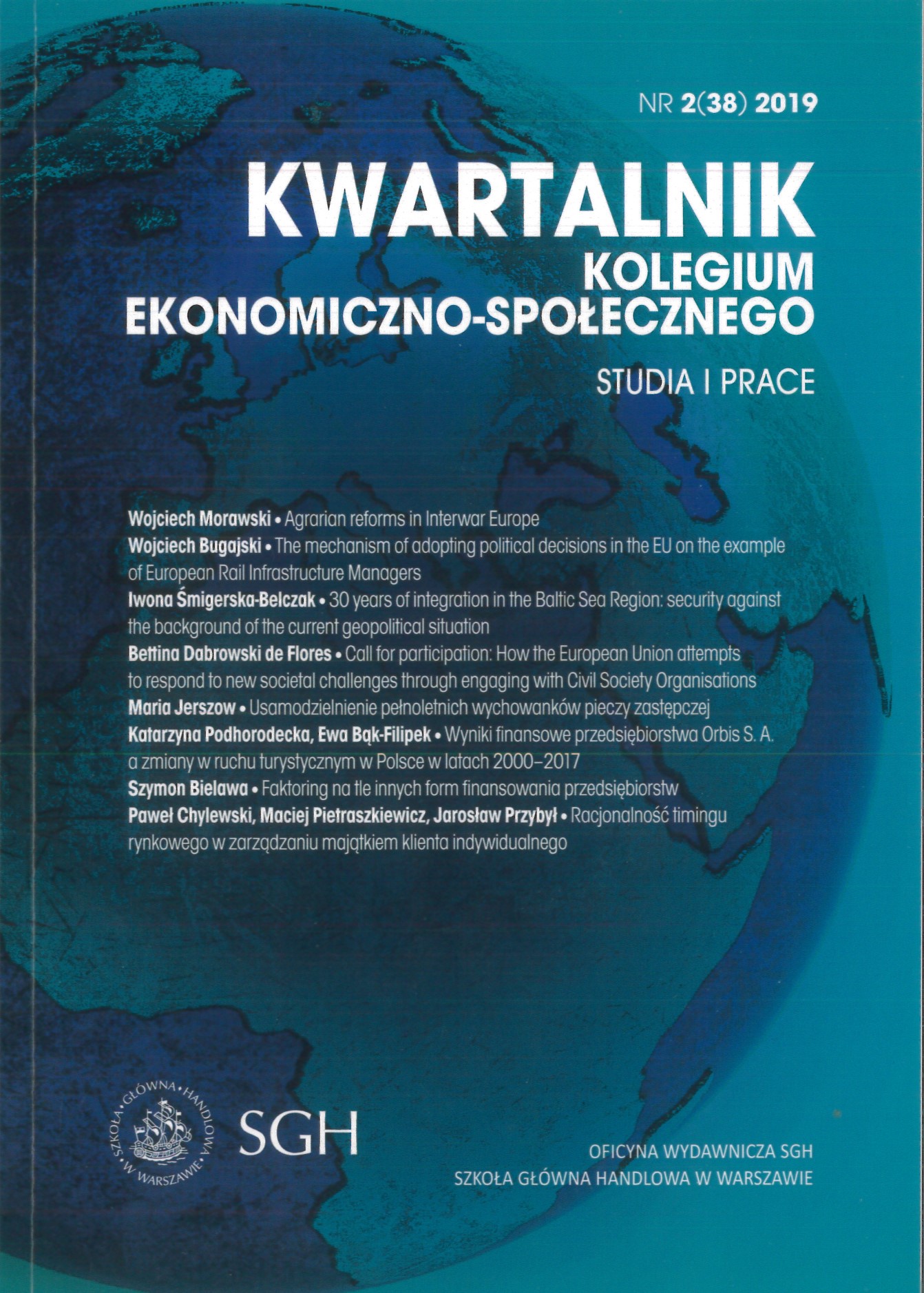Call for participation: How the European Union attempts to respond to new societal challenges through engaging with Civil Society Organisations
Main Article Content
Abstract
The changing social environment prompted the European Union (EU) to rethink its strategies towards its citizens. Phenomena such as distrust towards government institutions, nationalist movements and the alleged democratic deficit are the reasons why the EU aims at engaging with the civil society in its public policy, ranging from agenda setting to decision-making via instruments such as consultations. This paper intends to analyse the rationale behind implementing and pursuing this strategy. As the EU tries to increase its legitimacy, it needs to be evaluated if the EU meets the demands of citizens. For this analysis, a structured literature review will be conducted. This article desires to demonstrate that civil society organisations undergo processes of professionalization and transformation into providers of knowledge and expertise; therefore, ordinary citizens are not represented adequately in the EU via CSOs. Hence, the EU has desired to get closer to its citizens; however, with the current strategies the importance of membership has decreased and the opportunities for engagement have become more elitist. Further research is needed to evaluate the reasons behind this trend for the EU to draw appropriate conclusions and re-formulate its policy towards including its citizens.
Downloads
Article Details
Autor (Autorzy) artykułu oświadcza, że przesłane opracowanie nie narusza praw autorskich osób trzecich. Wyraża zgodę na poddanie artykułu procedurze recenzji oraz dokonanie zmian redakcyjnych. Przenosi nieodpłatnie na Oficynę Wydawniczą SGH autorskie prawa majątkowe do utworu na polach eksploatacji wymienionych w art. 50 Ustawy z dnia 4 lutego 1994 r. o prawie autorskim i prawach pokrewnych – pod warunkiem, że praca została zaakceptowana do publikacji i opublikowana.
Oficyna Wydawnicza SGH posiada autorskie prawa majątkowe do wszystkich treści czasopisma. Zamieszczenie tekstu artykuły w repozytorium, na stronie domowej autora lub na innej stronie jest dozwolone o ile nie wiąże się z pozyskiwaniem korzyści majątkowych, a tekst wyposażony będzie w informacje źródłowe (w tym również tytuł, rok, numer i adres internetowy czasopisma).
Osoby zainteresowane komercyjnym wykorzystaniem zawartości czasopisma proszone są o kontakt z Redakcją.
References
2. Broscheid A., Coen D., Business Interest Representation and European Commission Fora: A Game Theoretic Investigation, MPIfG Working Paper No.02 (7), Max Planck Institute for the Study of Societies 2002.
3. Bunea A., Regulating European Union Lobbying: In Whose Interest?, “Journal of European Public Policy” 2018, No. 4 (33).
4. Finke B., Civil Society Participation in EU Governance, “Journal of European Public Policy Living Reviews in European Governance” 2007, No. 2.
5. Frane A., Civil Society Organisations in a Knowledge Based Society, [in:] Opening EU-Governance to Civil Society. Gains and Challenges, B. Kohler-Koch, D. de Bièvre, W. Maloney (Eds.), “CONNEX Report Series”, Mannheim 2008.
6. Grande E., The State and Interest Groups in a Framework of Multi-level Decision-making: The Case of the European Union, “Journal of European Public Policy” 1996, No. 3 (3).
7. Greenwood J., Interest Representation in the European Union, Palgrave, London 2017.
8. Kohler-Koch B., How to Put Matters Right? Assessing the Role of Civil Society in EU Accountability, “West European Politics” 2010, No..5 (33).
9. Kohler-Koch B., de Bièvre D., Maloney W., Opening EU-Governance to Civil Society. Gains and Challenges, “CONNEX Report Series”, Mannheim 2008.
10. Kohler-Koch B., Quittkat C., De-Mystification of Participatory Democracy: EU-Governance and Civil Society, Oxford University Press, Oxford 2013.
11. Maloney W., The Professionalization of Representation: Biasing Participation, [w:] Opening EU-Governance to Civil Society. Gains and Challenges, B. Kohler-Koch, D. de Bièvre, W. Maloney (Eds.), “CONNEX Report Series”, Mannheim 2008.
12. Moravcsik A., In Defense of the “Democratic Deficit”: Reassessing Legitimacy in the European Union, Center for European Studies Working Paper No. 92, 2002.
13. Quittkat C., Finke, B., The EU Commission Consultation Regime, [in:] Opening EUGovernance to Civil Society. Gains and Challenges, B. Kohler-Koch, D. de Bièvre, W. Maloney) Eds.), “CONNEX Report Series”, Mannheim 2008..
14. Rasmussen A., Toshkov, D., The Effect of Stakeholder Involvement on Legislative Duration: Consultation of External Actors and Legislative Duration in the European Union, “European Union Politics” 2013, No. 3 (14).
15. Reed M., Stakeholder Participation for Environmental Management: A Literature Review, “Biological Conservation” 2008, No. 10 (141).
16. Sarugger S., The Professionalisation of Interest Representation: A Legitimacy Problem for Civil Society in the EU?, [in:] Civil Society and Legitimate European Governance, S. Smismans (Ed.), Edward Elgar Publishing, Northampton 2006.
17. Saurugger S., Interest Groups and Democracy in the European Union, “West European Politics” 2008, No. 6 (31).
18. Schneider S., EU’S Democratic Deficit, Democratic Innovations, and Social Inequality: Assessing Participation in the European Citizens Initiative, Conference Paper for IPSA World Congress Montreal, Canada, 19–24. July 2014.
19. vanDeth J., European Civil Society: The Empirical Reality in the Multi-Level System of the EU, [w:] Opening EU-Governance to Civil Society. Gains and Challenges, B. KohlerKoch, D. de Bièvre, W. Maloney (Eds.), “CONNEX Report Series”, Mannheim 2008.
